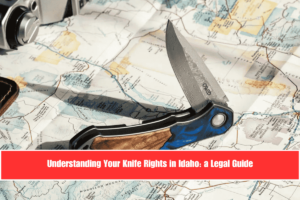In New Jersey, the laws governing the possession, carry, and use of knives are complex and strict. Understanding these regulations is essential to avoid legal trouble. The state defines which types of knives are permitted and prohibited, outlines rules for carrying them openly or concealed, and specifies restricted locations.
This article covers key aspects of New Jersey’s knife laws, including types of legal and illegal knives, carrying rules, restricted locations, exceptions for law enforcement or military personnel, and the consequences of violating these laws.
Types of Knives in New Jersey
Legal Knives
In New Jersey, individuals are generally allowed to own and possess certain types of knives, including:
- Kitchen knives
- Pocket knives with a blade length under a certain limit (usually less than 5 inches, though this can vary)
- Utility knives
These knives are legal as long as they are used for lawful purposes, such as cooking, daily tasks, or personal use.
Illegal Knives
New Jersey also bans specific types of knives. These prohibited knives include:
- Gravity knives
- Switchblade knives
- Dagger and dirks
- Ballistic knives
- Stiletto knives (if intended for unlawful use against another person)
It’s important to note that even if a knife is legally owned, using it in a threatening manner can lead to criminal charges.
Carrying Knives in New Jersey
Open Carry
New Jersey doesn’t have laws specifically addressing the open carry of legal knives. However, if you are carrying a knife with an unlawful purpose, or if it’s carried in a restricted area, you could face criminal charges.
Concealed Carry
Carrying a knife concealed is restricted in New Jersey. The main factor in determining whether concealed carry is lawful is the intent behind carrying the knife. If you’re caught carrying a concealed knife with the intent to use it unlawfully, it is illegal.
Restricted Locations for Knives in New Jersey
There are certain places where knives are strictly prohibited in New Jersey. These locations include:
- Schools and educational institutions
- Government buildings
- Public transportation facilities
- Airports
- Places of public assembly, like sports stadiums and concert halls
If you carry a knife into these restricted areas, you could face significant legal consequences.
Law Enforcement and Military Exceptions
Law enforcement officers and military personnel are generally exempt from many of the restrictions on knife possession and carry. These exemptions apply both during and outside of their official duties.
However, it is crucial to remember that any unlawful use of knives, even by law enforcement or military personnel, can lead to charges.
Consequences of Violating Knife Laws
Violating knife laws in New Jersey can lead to serious consequences. Penalties vary depending on the nature of the violation but may include:
- Fines
- Imprisonment
- Criminal record
The severity of the consequences depends on factors such as the type of knife, the intent behind carrying it, and the location where the knife was carried.
FAQ Section
What knives are legal in New Jersey?
In New Jersey, kitchen knives, pocket knives (with blades shorter than certain lengths), and utility knives are generally legal to own and possess.
What knives are illegal in New Jersey?
Gravity knives, switchblades, dagger and dirks, ballistic knives, and stiletto knives (if intended for unlawful use) are illegal in New Jersey.
Can I carry a knife openly in New Jersey?
New Jersey does not specifically regulate the open carry of legal knives, but carrying a knife for an unlawful purpose or in restricted areas is illegal.
Is it illegal to carry a concealed knife in New Jersey?
Yes, carrying a concealed knife is restricted in New Jersey, and doing so with an unlawful intent can result in criminal charges.


















Leave a Reply